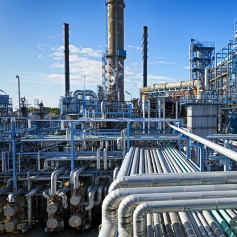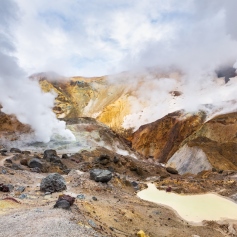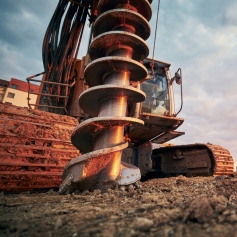Subsurface energy
The UK has a legally binding target to achieve net-zero greenhouse gas (GHG) emissions by 2050 which, coupled with increased global demand for energy, will require fundamental changes to our energy system.
This transition will require us to draw on the scientific, engineering, technical environmental, political, economic and societal expertise of the University. Subsurface energy has to be part of the solution to ensure security and affordability of supply as well as environmental sustainability.
Our current key areas of research include:
-
Carbon capture and storage
Carbon capture and storage (CCS) is an important component of many initiatives to reduce global GHG emissions. Researchers use a variety of approaches to address questions around CCS from characterising CO2 storage sites, ensuring CO2 security and ‘fixing’ CO2 in geological strata, as well as combining biomass energy with CCS and looking at the public’s perception of these low carbon energy technologies.
-
Geothermal extraction
Geothermal energy is a clean, low carbon, renewable energy source that can be tapped in many countries around the world where warm and hot water can flow to the surface. Research in this area focuses on characterising the deep subsurface environment using a multi-disciplinary approach to generate new knowledge about the potential of geothermal systems to efficiently deliver clean energy.
-
Subsurface energy storage
We research how hydrogen and compressed air can be safely stored in a geological formation in such a way that it will remain there securely until needed. We are also deeply involved in the investigation of which geological sites are best suited for the safe disposal of radioactive (nuclear) waste.
Much of this work is conducted in the Department of Earth and Environmental Science by the Basins, Stratigraphy and Sedimentary Processes Group in collaboration with research projects in geothermal energy, carbon sequestration and subsurface fluid flow in the Department of Chemical Engineering, Department of Mechanical, Aeronautical and Civil Engineering and Department of Materials.
Our research
The University of Manchester has a long legacy of research in the energy sector and our subsurface research is an institution-wide effort integrating geological knowledge with engineering solutions.
Our current portfolio includes research into:
- Siliciclastic (e.g. sandstone, mudrock), carbonate (e.g. limestone) and evaporite (e.g. salt) sedimentary processes.
- Improving stratigraphic prediction through understanding of the internal and external controls on sedimentary systems.
- Basin analysis, including modelling of burial history, heat flow and fluid migration.
- Imaging and modelling of rock volumes for fluid and gas storage, subsurface fluid flow and seal integrity.
- The presence and distribution of pore types and how the volume, topology and distribution of those pores affects rock-physical properties, flow behaviour and economic value.
- Experimental investigation, imaging and modelling of geochemical and geomicrobial rock – mineral – fluid reactions and how they modify rock and fluid properties in time and space.
- Experimental imaging and modelling of multiphase fluid flow behaviour in naturally porous media.
- Rock deformation for the prediction of rock strength and failure in the subsurface and during operations.
- Geotechnical engineering of subsurface energy solutions.
- Experimental studies of rocks and minerals at high pressure and temperature and their impact on the Earth at different time scales.
- Life cycle assessment, and environmental, social and economic impacts.
We also have the capability to link to other research institutes at The University of Manchester, and external initiatives, to ensure we can integrate our subsurface knowledge with facilities design and near-surface environmental management:
- Henry Royce Institute and BP-ICAM conduct world-leading research into materials for demanding environments, nuclear materials, corrosion & degradation, fouling & scaling and materials systems.
- The Radioactive Waste Management Research Support Office is based within the Dalton Nuclear Institute and focusses on the safe geological disposal of the UKs radioactive waste.
- The Tyndall Centre, provides research into project lifecycle analysis and public perceptions of subsurface energy.
- The University of Manchester at Harwell (old) provides an interface between The University of Manchester and the national facilities at Harwell.
- The University has close links to the NERC Geo-observatories which provide field sites to pilot-test subsurface energy projects.
- The University of Manchester researchers are part of the UK CCS Research Centre which is a focal point for CCS research in the UK.
- Researchers in the Faculty of Humanities are looking at sustainable transitions to future ways of living on Earth.
Our researchers
Grant Allen
Professor
Research specialisms: Climate and climate change, climate modelling, decision making, earth system modelling, energy emissions, environmental assessment, environmental impact assessment, environmental modelling, greenhouse gas emission
Masoud Babaei
Lecturer in Petroleum Engineering
Research specialisms: Aquifers, CO2 transport systems, carbon capture and storage, carbon sequestration, computational fluid dynamics, earth engineering, earth system modelling, energy storage, enhanced oil recovery, environmental modelling, geochemistry, geomechanics, geothermal energy, hydrocarbon reservoirs, multiphase flow, oil/gas reservoir management, subsurface injection
Robert Bellamy
Presidential Fellow in Environment
Research specialisms: Carbon capture and storage, climate modelling, environmental impact assessment, greenhouse gas emission
Mike Bowman
Research specialisms: Aquifers, carbon capture and storage, carbon dioxide injection, carbon sequestration, climate and climate change, decision making, development policy, earth resources, earth surface processes, energy storage, enhanced oil recovery, environmental geology, geohazards, hydrocarbon reservoirs, oil/gas reservoir management, sediment/sedimentary processes, sedimentary basins, subsurface injection, tectonic processes, waste management
Mike Chandler
Research Associate
Research specialisms: Carbon capture and storage, earth engineering, earth resources, energy storage, geomechanics, geophysics, geostorage, geothermal energy, hydrocarbon reservoirs, oil/gas reservoir management, soil and rock: mechanics, subsurface injection
Stephen Covey-Crump
Senior Lecturer
Research specialisms: Engineering geology, geomechanics, geothermal processes, soil and rock: mechanics
Research specialisms: Carbon capture and storage, earth resources, earth surface processes, earth system modelling, geodynamics, hydrocarbon reservoirs, oil/gas reservoir management, ore deposits and mineralisation, sediment/sedimentary processes, sedimentary basins
Clair Gough
Senior Research Fellow
Research specialisms: Biomass, carbon capture and storage, carbon capture from free air, climate and climate change, greenhouse gas emission, stakeholder engagement and public/ social responses to the use of the subsurface
Mojgan Hadi Mosleh
Lecturer
Research specialisms: Carbon capture and storage, carbon sequestration, climate and climate change, energy emissions, engineering geology, environmental assessment, environmental geology, environmental impact assessment, extreme pressures, extreme temperatures, geochemistry, geodynamics, geohazards, geomechanics, geostorage, geothermal energy, geothermal processes, greenhouse gas emission, multiphase flow, soil and rock: mechanics, subsurface injection, waste management, wellbore integrity and leakage mitigation/remediation
Greg Holland
Senior Lecturer (Terr Noble Gas Geochem)
Research specialisms: Carbon capture and storage, carbon sequestration, geochemistry, hydrocarbon reservoirs, multiphase flow
Cathy Hollis
Reader in Petrophysics and Production Geoscience
Research specialisms: Carbon capture and storage, earth resources, geochemistry, geothermal processes, hydrocarbon reservoirs, sediment/sedimentary processes, sedimentary basins
Mads Huuse
Professor
Research specialisms: Aquifers, carbon capture and storage, carbon sequestration, computational methods and tools, earth surface processes, earth system modelling, engineering geology, environmental geology, geodynamics, geohazards, geomechanics, geostorage, geothermal energy, hydrocarbon reservoirs, oil/gas reservoir management, sediment/sedimentary processes, sedimentary basins, soil and rock: mechanics, subsurface injection, tectonic processes, gas hydrates, glaciation, stratigraphy, rock physics, fluid migration
Christopher Jackson
Professor of Sustainable Geoscience
Research specialisms: Carbon capture and storage, carbon sequestration, earth resources, earth surface processes, geodynamics, geohazards, geophysics, geostorage, geothermal energy, hydrocarbon reservoirs, oil/gas reservoir management, sediment/sedimentary processes, sedimentary basins, tectonic processes
Andrey Jivkov
Professor of Solid Mechanics
Research specialisms: Geomechanics, geophysics, soil and rock: mechanics
Amanda Lea-Langton
Lecturer in BioEnergy Engineering
Research specialisms: Bioenergy, biofuels, carbon capture and storage, energy emissions
Jingyi Li
Research specialisms: Carbon capture and storage, climate and climate change, development policy, environmental impact assessment, geothermal energy, geothermal processes, greenhouse gas emission, waste management
Qingming Li
Professor of Applied Mechanics
Research specialisms: Extreme pressures, extreme temperatures, geomechanics
Research specialisms: Biogeochemical cycles, earth surface processes, environmental geology, environmental governance, geochemistry, waste management
Jonathan Lloyd
Professor
Research specialisms: Biogeochemical cycles, biogeomicrobiology, carbon capture and storage, carbon cycling, energy storage, energy from waste, extreme pressures
Domenico Lombardi
Lecturer in Geotechnical Engineering
Research specialisms: Geohazards, geomechanics
Lin Ma
NERC Research Fellow
Research specialisms: Carbon sequestration, earth resources, enhanced oil recovery, geostorage, geothermal energy, geothermal processes, hydrocarbon reservoirs, multiphase flow
Sarah Mander
Reader
Research specialisms: Change, greenhouse gas emission, stakeholder engagement and public/ social responses to the use of the subsurface
Julian Mecklenburgh
Senior Lecturer
Research specialisms: Aquifers, carbon capture and storage, carbon dioxide injection, carbon sequestration, computer tomography, earth engineering, earth resources, energy storage, engineering geology, environmental geology, geodynamics, geomechanics, geothermal energy, geothermal processes, soil and rock: mechanics, tectonic processes, tectonic modelling
Research specialisms: Biogeochemical Cycles, Waste Management
Vahid Niasar
Senior lecturer and MS program director
Research specialisms: Aquifers, carbon sequestration, computational fluid dynamics, earth system modelling, enhanced oil recovery, environmental geology, environmental impact assessment, geochemistry, geothermal energy, multiphase flow, oil/gas reservoir management
Sophie Nixon
Research Fellow
Research specialisms: Biogeochemical cycles, biogeomicrobiology, carbon capture and storage, carbon cycling, energy storage, energy from waste, extreme pressures
Majid Sedighi
Senior Lecturer in Geotechnical Engineering
Research specialisms: Carbon sequestration, computational fluid dynamics, computational methods and tools, engineering geology, environmental geology, geochemistry, geomechanics, geothermal energy, geothermal processes, multiphase flow, soil and rock: mechanics, waste management
Ahmad Syed Mohd
Lecturer in Geotechnical Engineering
Research specialisms: Carbon sequestration, climate and climate change, climate modelling, energy storage, energy from waste, engineering geology, geohazards, geomechanics, geothermal energy, soil and rock: mechanics
Jonathan Taylor
Research Associate
Research specialisms: Carbon sequestration, earth engineering, earth surface processes, energy storage, engineering geology, sediment/sedimentary processes
Our facilities
- Workstations with industry-standard software for seismic interpretation, geophysical analysis, geocellular reservoir modelling, basin analysis and fluid flow (geochemical, reactive transport and hydrogeological) modelling.
- Petrographical suite (Nikon transmitted light microscopes, cathodoluminescence, UV fluorescence, SEM/BSEM, Raman spectroscopy, fluid inclusion analysis).
- Petrophysical and rock physical laboratory (porosity, permeability, Vp, Vs).
- Rock deformation laboratory that can deform rocks and minerals in compression, extension and torsion up to 1300 °C and 300 MPa.
- Access to the Williamson Research Centre which includes the Manchester Analytical Geochemistry Unit, the Mineral Analysis Facility and molecular environmental science facilities.
- Established working relationship with the Henry Royce Institute for the characterisation of pores, fluids and rocks (x-ray CT, SEM, FIB-SEM, TEM, AMF).
- Manchester X-Ray Imaging Facility and The University of Manchester at Harwell have facilities for in-situ imaging of fluids, rocks and fluid-rock interaction under realistic subsurface conditions (temperature, pressure, and brine etc.).
- The Department of Chemical Engineering have in-house computational tools for pore-scale modelling and advanced techniques for characterising and imaging rock-fluid interactions.
- The Photon Science Institute provides comprehensive photonic imaging and characterisation capability.
- The Department of Computer Sciences have powerful super computers for modelling and geo-modelling.



